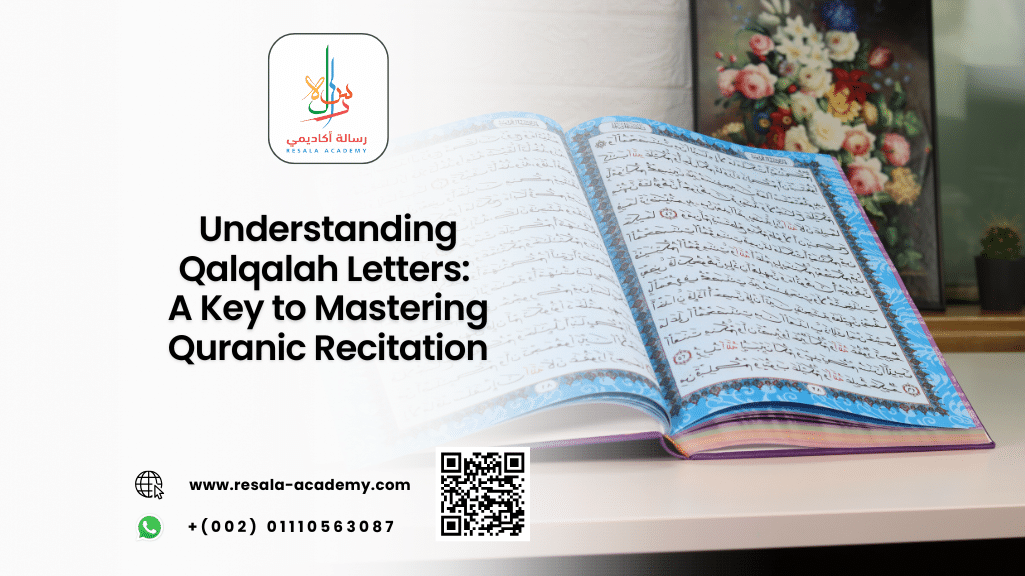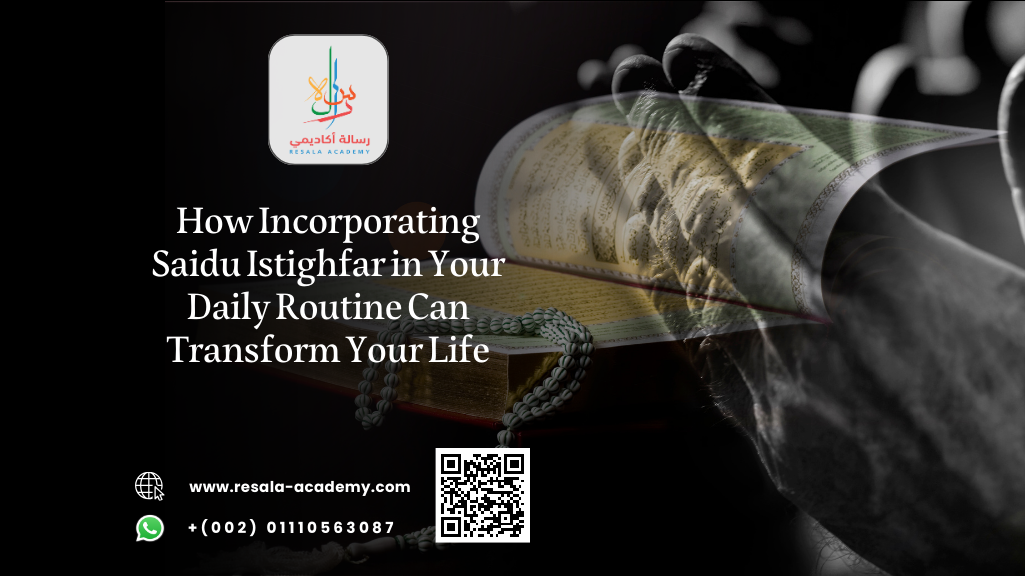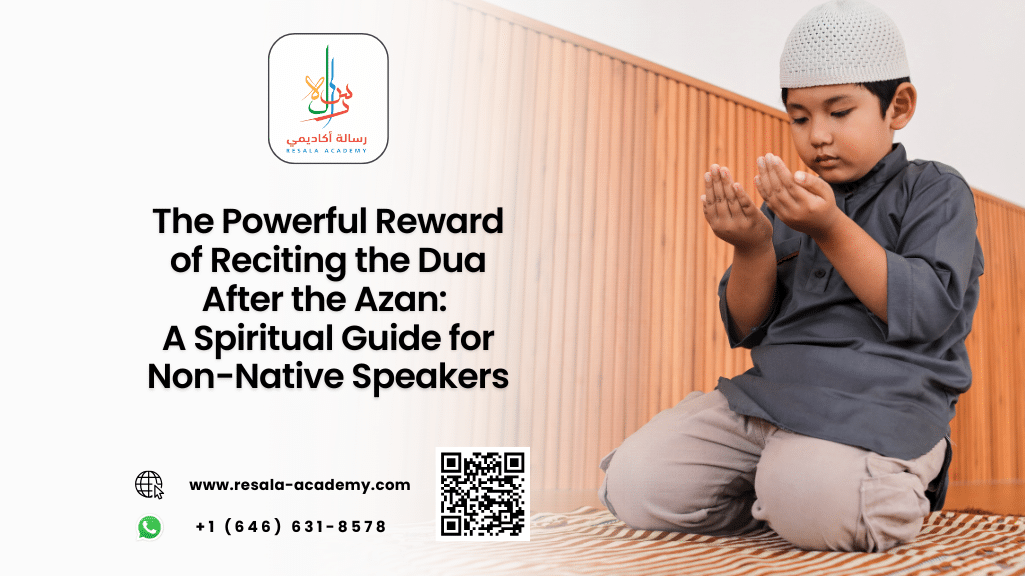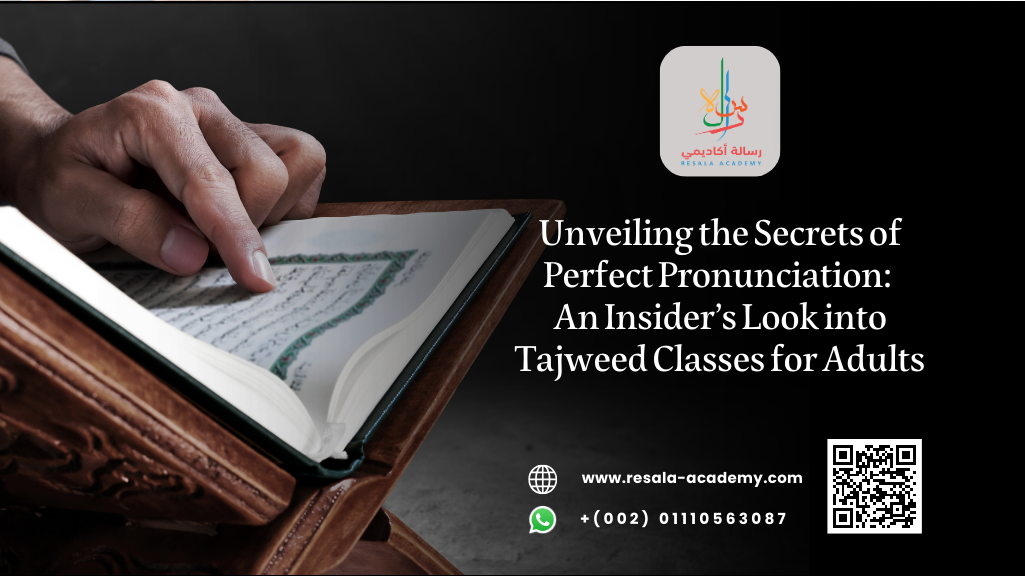Table of Contents
Understanding Qalqalah Letters: A Key to Mastering Quranic Recitation
Learning to recite the Quran correctly is a spiritual and linguistic journey. One of the most essential aspects of proper Quranic pronunciation is mastering the concept of qalqalah letters. These unique letters play a pivotal role in the science of Tajweed—the set of rules governing the correct pronunciation during Quranic recitation.
In this comprehensive guide, we will explore what qalqalah letters are, how they function in Quranic recitation, and why they are crucial for non-native Arabic speakers. We will also highlight how institutions like Resala Academy are helping students worldwide master these concepts through expertly designed courses in Arabic and Quranic studies.
What Are Qalqalah Letters?
The term Qalqalah (القلقلة) in Arabic linguistics refers to an echoing or bouncing sound that occurs when certain consonants are pronounced with a sukoon (i.e., without a vowel). This phonetic phenomenon is unique to the Arabic language and is vital for maintaining the clarity and beauty of Quranic recitation.
The Five Qalqalah Letters
There are five specific letters in Arabic that exhibit qalqalah when they are in a state of sukoon. These are:
- ق (Qaf)
- ط (Ta)
- ب (Ba)
- ج (Jeem)
- د (Dal)
An easy mnemonic to remember them is the Arabic word: قطب جد (Qutb Jad), which combines all five letters.
Types of Qalqalah
To master the pronunciation of qalqalah letters, it’s important to understand the different types based on the position of the letter in a word and the strength of the echo.
1. Qalqalah Sughra (Minor Echo)
Occurs when a qalqalah letter is in the middle or end of a word and is in a state of sukoon due to the original structure of the word.
Example from the Quran:
وَخَلَقْنَاكُمْ أَزْوَاجًا
“And We created you in pairs.”
Surah An-Naba (78:8)
Here, the letter ق in “خَلَقْنَاكُمْ” is pronounced with a slight bounce.
2. Qalqalah Kubra (Major Echo)
Occurs when a qalqalah letter is at the end of a word and the sukoon is due to a stop (waqf) in recitation. The echo is more pronounced.
Example from the Quran:
تَبَّتْ يَدَا أَبِي لَهَبٍ وَتَبَّ
“May the hands of Abu Lahab be ruined, and ruined is he.”
Surah Al-Masad (111:1)
The ب at the end of “تَبَّ” is recited with a strong bounce.
The Importance of Qalqalah in Tajweed
Proper application of qalqalah is not just about phonetics—it preserves the meaning of the Quran and enhances its rhythmic beauty. Mispronunciation can lead to a distortion of meaning, which is why mastering qalqalah is essential for every student of the Quran.
Why Non-Native Speakers Struggle
Non-native Arabic speakers often find it challenging to differentiate between qalqalah and other types of consonant articulation. This is where structured learning through qualified teachers becomes crucial.
How to Practice Qalqalah Letters
To effectively learn and apply qalqalah letters, consider the following strategies:
✅ Listen to expert reciters: Pay attention to how they pronounce qalqalah letters, especially during pauses.
✅ Practice with a teacher: Get feedback on your pronunciation.
✅ Record yourself: Compare your recitation with that of proficient Qaris.
✅ Use Tajweed apps: Many apps highlight qalqalah letters during recitation.
Quranic Examples of Qalqalah Letters
Let’s explore more examples from the Quran to understand how these letters function in real recitation:
ق (Qaf)
وَاللَّهُ خَلَقَكُمْ وَمَا تَعْمَلُونَ
“And Allah created you and that which you do.”
Surah As-Saffat (37:96)
ط (Ta)
وَالطُّورِ
“By the Mount.”
Surah At-Tur (52:1)
ب (Ba)
قُلْ أَعُوذُ بِرَبِّ الْفَلَقِ
“Say, I seek refuge in the Lord of daybreak.”
Surah Al-Falaq (113:1)
ج (Jeem)
وَجَعَلْنَا مِنَ الْمَاءِ كُلَّ شَيْءٍ حَيٍّ
“And We made from water every living thing.”
Surah Al-Anbiya (21:30)
د (Dal)
قَدْ أَفْلَحَ الْمُؤْمِنُونَ
“Certainly will the believers have succeeded.”
Surah Al-Mu’minun (23:1)
Deepening Your Mastery of Qalqalah Letters with Structured Learning at Resala Academy
To truly internalize the correct articulation of qalqalah letters, learners must move beyond theoretical understanding and engage in structured, practical application. This is where Resala Academy excels—offering a dynamic, immersive environment tailored specifically for non-native speakers seeking fluency in Quranic recitation and Arabic phonetics.
Here’s how Resala Academy optimizes your learning experience for mastering the echoing sounds of qalqalah:
Focused Phonetic Drills
- Each of the five qalqalah letters—ق, ط, ب, ج, د—is introduced with detailed phonetic breakdowns.
- Students engage in repetition drills that isolate each letter in various positions (beginning, middle, and end of words) to ensure accurate pronunciation.
Live Feedback from Certified Tajweed Experts
- Real-time correction ensures that learners develop muscle memory for the proper articulation of qalqalah sounds.
- Teachers at Resala Academy are Ijazah-certified, meaning they are authorized to teach the Quran with an unbroken chain of transmission.
Interactive Learning Tools
- Visual aids, audio loops, and annotated Quranic verses help learners identify and practice qalqalah letters in context.
- The platform includes quizzes and exercises that reinforce recognition and recitation accuracy.
Progressive Curriculum Design
- Lessons are structured to gradually introduce more complex applications of qalqalah, such as distinguishing between minor (sughra) and major (kubra) qalqalah.
- Students also learn how qalqalah interacts with other Tajweed rules like idgham and ikhfa for a holistic understanding.
Global Accessibility and Flexible Scheduling
- Resala Academy offers 24/7 class availability, accommodating students from all time zones.
- Whether you’re a beginner or an advanced learner, you can find a course that fits your level and schedule.
Practical Benefits of Learning Qalqalah Letters with Resala Academy’s Specialized Approach
Understanding the theoretical aspects of qalqalah letters is just the beginning. The real transformation happens when learners apply this knowledge in their daily recitation, prayer, and memorization. Resala Academy ensures that students not only learn but live the principles of Tajweed.
Here’s what makes their approach uniquely effective:
Quran-Based Application
- Students recite verses where qalqalah letters are prevalent, such as Surah Al-Masad, Surah Al-Falaq, and Surah Al-Mu’minun.
- Emphasis is placed on stopping (waqf) at appropriate places to practice qalqalah kubra, enhancing both rhythm and clarity.
Accent Neutralization for Non-Native Speakers
- Many non-Arabic speakers struggle with overemphasizing or under-articulating qalqalah.
- Resala Academy’s instructors help neutralize these issues, ensuring authentic pronunciation that aligns with classical Arabic standards.
Audio-Visual Integration
- Learners are provided with curated recitations by renowned Qaris like Mishary Alafasy and Abdul Basit, highlighting the correct use of qalqalah.
- Visual waveform analysis tools are used to show the bounce effect in real-time, making abstract concepts tangible.
Certification and Recognition
- Upon completion of the Tajweed course, including mastery of qalqalah letters, students receive a certificate from Resala Academy.
- This credential is recognized by various Islamic educational institutions and adds credibility to your Quranic proficiency.
Community Support and Peer Learning
- Students join a global network of learners, sharing tips, recordings, and feedback.
- Group recitation sessions and peer reviews foster a collaborative learning environment.
By enrolling in Resala Academy, you’re not just learning the mechanics of qalqalah letters—you’re embracing a transformative journey that connects you more deeply with the sacred text of the Quran.
Why Choose Resala Academy to Learn Qalqalah?
Resala Academy is a premier online institution dedicated to teaching Arabic and Quran to non-native speakers. With a focus on Tajweed, including qalqalah letters, Resala Academy offers:
- Certified Arabic and Quran teachers
- Flexible online classes for all time zones
- Interactive live sessions and recorded lessons
- Customized learning plans for all levels
Whether you’re a beginner or looking to refine your recitation, Resala Academy provides the tools and guidance needed to master the art of Quranic pronunciation.
Master the Melody of the Quran with Resala Academy
Are you ready to elevate your Quranic recitation and deepen your connection with the Divine Word? Join thousands of students worldwide who are mastering qalqalah letters and other Tajweed rules with expert guidance at Resala Academy.
Enroll today and begin your journey toward eloquent and meaningful recitation. Your voice can echo the beauty of the Quran—let Resala Academy show you how.
Frequently Asked Questions (FAQs)
1. What are qalqalah letters in Arabic?
Qalqalah letters are five specific Arabic consonants—ق, ط, ب, ج, د—that produce a bouncing or echoing sound when pronounced with a sukoon. This feature is essential in Tajweed for proper Quranic recitation.
2. Why is qalqalah important in Tajweed?
Qalqalah ensures clarity and prevents distortion of Quranic words. It adds rhythm and precision to the recitation, preserving both the meaning and the beauty of the Quran.
3. How can I practice qalqalah effectively?
You can practice by:
- Listening to expert Qaris
- Repeating after recordings
- Taking live Tajweed classes at Resala Academy
- Using Quran apps that highlight Tajweed rules
4. Can I learn qalqalah online?
Absolutely. Platforms like Resala Academy specialize in teaching Quran and Arabic online, with dedicated Tajweed modules that include qalqalah training.
5. Are there any Hadiths that emphasize proper Quranic recitation?
Yes. The Prophet Muhammad ﷺ said:
خَيْرُكُمْ مَنْ تَعَلَّمَ الْقُرْآنَ وَعَلَّمَهُ .
“The best among you are those who learn the Quran and teach it.”
Sahih al-Bukhari 5027
This Hadith underscores the importance of learning and teaching the Quran correctly, including mastering its pronunciation rules like qalqalah.
Conclusion
Mastering qalqalah letters is a foundational step in the journey of Quranic recitation. It enhances not only the phonetic beauty of the Quran but also ensures the preservation of its divine message. For non-native speakers, learning these rules can be challenging—but with the right guidance, it becomes an achievable and rewarding goal.
Institutions like Resala Academy are making it easier than ever to learn Arabic and the Quran from the comfort of your home. With expert teachers, flexible schedules, and a curriculum tailored for non-native speakers, you can confidently embark on your journey to mastering the Quran.
🔗 Explore more about Tajweed and Quranic studies at Resala Academy and take the first step toward perfecting your recitation today!




